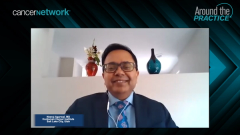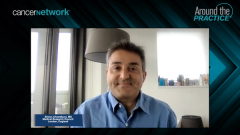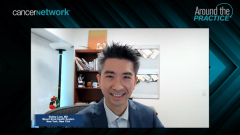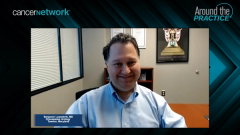
Metastatic CSPC: Future Directions in Care
Before closing out their discussion on novel treatment approaches to metastatic CSPC, expert panelists share hope for further evolution in care.
Episodes in this series

Transcript:
Neeraj Agarwal, MD: I will ask Bobby about his perspective on exciting advances being made in metastatic hormone-sensitive prostate cancer now, beyond triplet and doublet therapy. And I’ll give you, say, one minute. Now we are wrapping up. Please tell me what trials you’re excited about in metastatic castration-sensitive prostate cancer [CSPC].
Bobby Liaw, MD: Since I only have one minute, I’ll give you just 2 general ideas. I am quite excited about some of the advances being made toward PSMA [prostate-specific membrane antigen]-directed therapies, like lutetium-177 finally came through with approval in the United States. But certainly, how we try to use a drug that’s right now reserved for a much more advanced, much more resistant disease state, how we use that perhaps a little earlier, I’m excited about that. Certainly, there will be PSMA-directed immunotherapies, such as bispecific T-cell engagers. Those are still in early stage trials, but I am excited that we are getting to a point where we have “next-generation” immunotherapy that might be in the pipeline. Outside of that, I think the AR [androgen receptor] pathway remains to be explored, such as PROTAC [proteolysis-targeting chimera] AR degraders, things that would help us bypass some of the insensitivity that AR variants might give a patient’s disease.
Neeraj Agarwal, MD: Thank you. Indeed, novel therapies, exciting therapies are moving into the hormone-sensitive prostate cancer setting. I would like to add 2 or 3 trials to that list that are registration phase 3 trials, starting with the recently announced CYCLONE 3 trial, which is testing the utility of abemaciclib in the hormone-sensitive prostate cancer setting. This is ADT [androgen deprivation therapy] plus abiraterone plus/minus abemaciclib. We know these CDK4/6 inhibitors have a long history of success in breast cancer. We’ll see if this strategy may pan out in patients with metastatic castration-sensitive prostate cancer. Of course, the PARP inhibitor trials with niraparib; AMPLITUDE is a phase 3 trial of ADT plus abiraterone plus/minus niraparib. And there is the TALAPRO-3 trial of ADT plus enzalutamide plus/minus talazoparib. All these trials will tell us in the next few years if using these strategies may enhance our patients’ survival and quality of life simultaneously in the near future.
I would like to ask all of you for your final conclusions, practicing medicine in the context of metastatic castration-sensitive prostate cancer. Any final remarks? I’ll start with Simon.
Simon Chowdhury, MD: Thanks to Bobby and Ben, I’ve learned a lot. I think every patient is individual, but we need to have a general treatment algorithm for that. The last thing for me is about ADT toxicity and trying to get men with an undetectable PSA [protein-specific antigen], with normal testosterone. I think that’s something we need to achieve going forward. I’ll pass over to the other panelists now.
Neeraj Agarwal, MD: Thank you. How about you, Bobby? Any final comments on treating patients with metastatic castration-sensitive prostate cancer?
Bobby Liaw, MD: Yes, perhaps in a slightly different way. As we talk about intensifying treatment for metastatic castration-sensitive prostate cancer, one of the things is to consider where the patients are coming from. It’s often overwhelming to hear that you need so many different things to start at the same time. Even in the situation where we’re talking, let’s say triplet therapy, I do give the patients a window of 2 to 3 months for us to slowly roll things out. That generally makes it a little easier for them to digest and come to terms with, because on the back end we’re also thinking about things to support them because of the ongoing use of ADT, bone health, use of denosumab, things like that. Just always keep in mind the patient’s perspective that we have to guide through this tough situation.
Neeraj Agarwal, MD: Ben, any final comments for our listeners and our colleagues out there who are treating patients with metastatic castration-sensitive prostate cancer?
Benjamin Lowentritt, MD: No. The only additional thought is that these patients, because thankfully we have these great options, they’re going to be on these treatments for longer. We do need to be increasingly sensitive to the other things we’re causing with these therapies, whether they be the bone health issues, cardiac, metabolic, cognitive issues. These are now more and more coming to the fore because we’re seeing them more and more because patients are living longer. The blessing and the curse of having better agents is we need to get better about our supportive care as well. I’m really motivated to continue to work on that.
Neeraj Agarwal, MD: Thank you to Drs Chowdhury, Liaw, and Lowentritt for joining us in this lively discussion on the treatment of patients with metastatic castration-sensitive prostate cancer, brought to you by CancerNetwork®. Thank you to our viewing audience. We hope you found this interactive discussion to be informative and beneficial to your clinical practice.
Transcript edited for clarity.
Newsletter
Stay up to date on recent advances in the multidisciplinary approach to cancer.










































